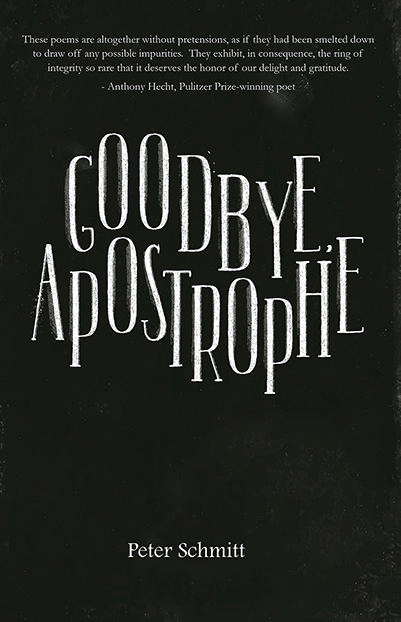
The poet Denise Levertov praises Schmitt’s style as “straightforward” with “subtleties of discovery and
recognition,” yoking the simple with the complex. He seldom employs rhyme and avoids complicated stanzas, but each poem invites the kind of “ear reading” Frost prized as essential to register subtleties of thought. One of
the most purely playful of Schmitt’s poems is tersely titled “Typos”:
I urge my students to watch for typos:
how do I know you mean tap dancer
when I’m staring hard at a lap dancer?
And your performing unasked-for lipo
on the great and ancient Chinese poet
is unintentional, I’m sure, but lacks
respect, all the same. Pubic goes public
too often these days—to what do we owe it?—
loins are lions when the mood’s conducive,
and immoral, yes, has proved immortal
since probably time immemorial,
but your paper’s not the place to prove it.
Did old poets write with rhyme and meaner?
Or with a more cheerful misdemeanor?

Goodbye, Apostrophe
By Peter Schmitt ’80
Regal House Publishing
This sonnet needs to be not only read but listened to in order to hear the small variations in tone as the voice navigates its syntactical energies to satisfying, humorous effect.
There’s no doubt that Schmitt is a clever man with words; what’s impressive is the way cleverness is not the end his poems have in sight. The title poem is a lovely example of how the listening reader gets caught up in something he hadn’t predicted. “Goodbye, Apostrophe” begins as a catalogue of disappearing objects in the digital world:
Goodbye, apostrophe—
you were barely hanging on
at the top of the line
by one curled fingertip,
and now it appears you’ve fallen
from the keypads of all the smartest phones—
The poem proceeds to say an affectionate goodbye to the turn signal, to the incandescent lightbulb and then, in an unexpected way, to the poet’s dead mother. He notes that a squirrel darting under his car has survived unscathed (“as if there wasn’t room in the world / for one more death, however small”) and thus finds the right words to address his mother:
My light, my direction,
mine—goodbye.
T.S. Eliot, searching for a way to praise the wit of Andrew Marvell, called it a “tough reasonableness beneath a slight lyric grace.” I think Schmitt’s work deserves to be appreciated in some such terms.
The final poem in the book, “Blockage,” is also its most personal—21 lines about a blocked artery remedied by a stent that may have saved the speaker’s life. It’s unusual for Schmitt, in that the lines are end-rhymed, if somewhat loosely. The poem’s first half is about the medical event; the second moves inside the poet’s mind:
When the words won’t come, when scenes
fail to appear, or to mean
in some signifying way—
an emotional X-ray—
I need to summon the faith
that language will find a path
past any restraint …
It ends with a plea: “let speech return to my tongue / let me live to write again.”
The poems in Goodbye, Apostrophe beautifully testify that his plea was granted.
Pritchard is Amherst’s Henry Clay Folger Professor of English, Emeritus. Next fall he’s teaching a course on 20th-century British and American poets. His new book, Dinosaur Reflections: Literary Essays and Reviews, includes bulletins to students from the early days of the pandemic.
Illustration by Melinda Beck